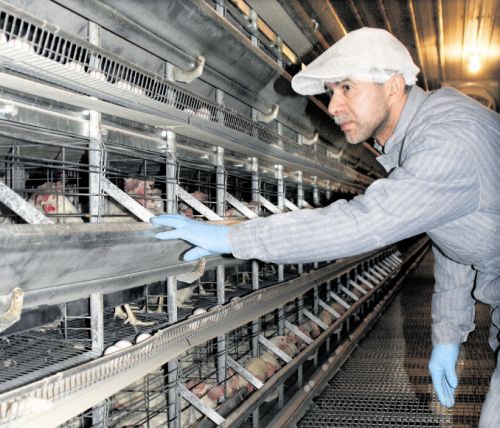TEST: Egg bill chances dimming in Congress
Published 12:56 am Wednesday, May 22, 2013

- Caesar Araiza, production manager at Willamette Egg Farms in Moses Lake, Wash., checks laying hens on Feb. 25. There are three tiers of cages on one floor and four on another. Rows are 400 feet long. At full capacity, five houses hold 725,000 hens producing about 648,000 eggs a day.
Federal standards for the welfare of egg-laying hens suffered a defeat when they failed to make it into the farm bill legislation voted out of the agriculture committees in the U.S. House and Senate. The full Senate was debating its version of the farm bill this week. Attempts at floor amendments likely will fail but the standards could come back to life when the farm bill reaches the joint House-Senate conference committee, said Bradley Miller, national director of the Humane Farming Association in San Francisco and an opponent of the federal standards. “Odds are in the opponents’ favor right up until the conference committee and then it’s anyone’s guess,” Miller said. Pork, beef and other livestock commodity groups oppose the so-called egg bill because it sets a precedent for federal control over the management of livestock. The Humane Farming Association and more than 20 affiliated animal-protection groups oppose the egg bill as a “sell-out” by The Humane Society of the United States to United Egg Producers by codifying larger, colony cages for egg-laying hens instead of banning all cages. HSUS at one time condemned colony cages of 116 square inches per hen as not good enough, but then supported it in its compromise with the UEP to gain a federal standard, Miller said. “Now it is evident that HSUS’s surrender to the egg industry is not conditioned on passage of a federal bill but is an unconditional surrender betraying animal advocates even further by embracing cages on a state level,” Miller said. He pointed to a May 9 Sonoma News article in which Arnie Riebli, a large California egg producer, said HSUS agreed to the 116-square-inch standard in California even if the federal bill fails. Riebli told Capital Press that HSUS did not tell him it would agree to the 116-square-inch standard but that he assumes it would for all states since that HSUS endorsed that standard in the federal proposal. If the egg bill fails and an amendment by Rep. Steve King, R-Iowa, in the House version stands, prohibiting a state from imposing its egg standards on other states, “California egg producers, for all intents and purposes, are gone,” said Riebli, who is president of the Association of California Egg Farmers and president of Sunrise Farms, a 1 million-hen operation in Sonoma County. The
California Department of Food and Agriculture
last week set a standard of 116 square inches per hen, Riebli said. California’s Proposition 2, passed in 2008, required hens have space to turn around and stretch their wings but did not specify space. Without 116 square inches as a federal standard, other states will be able to produce eggs in conventional battery cages of 67 square inches per bird at half the cost of California and put California egg farmers out of business, he said. “Last week was not a good week,” Riebli said. “It was kind of like chicken little, only the sky came down.” Miller also cited an April 26 Stanislaus Farm News article about HSUS President and CEO Wayne Pacelle’s visit and approval of colony cages at a JS West facility in Livingston, Calif. HSUS surrendered on cages to obtain federal control, to be able to point to an achievement and maybe to tone down its political activism to counter a call by Rep. Blaine Luetkemeyer, R-Mo., for the IRS to investigate it for excessive attempts to influence public policy in violation of rules for nonprofits, Miller said. Paul Shapiro, vice president of farm animal protection at HSUS, said the organization will not support 116 inches per bird if the egg bill fails. He said Miller is “factually false” in saying HSUS has unconditionally surrendered. Greg Satrum, vice president of Willamette Egg Farms, Portland, said he’s disappointed that the American Farm Bureau Federation and animal agriculture groups “are so committed to scoring a short-term win over HSUS that they are willing to hurt multi-generation family egg farms on the West Coast that are just trying to follow the best current science on hen welfare.” The King amendment is a likely unconstitutional attempt to further centralize animal ag in the Midwest, where many caged hens have less than 67 square inches, he said.









